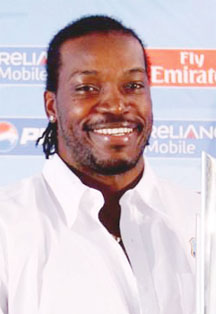MIAMI, (Reuters) – Chris Gayle heads into the World Cup with a reputation as one of the world’s most fearsome strokeplayers but also as a player who needs consistent big-tournament success to match his undoubted talent.
The powerfully built Jamaican left-hander had a poor World Cup four years ago, managing just one half-century in the tournament.
Since then Gayle, who relishes the cut and thrust of Twenty20 cricket, has made no secret of his preference for the shorter versions of the game, sounding dismissive at times about test cricket.
It was, though, in that format, against Sri Lanka in November, that he offered the most stunning example yet of how he can single-handedly destroy a bowling attack.
With that innings in Galle, Gayle became the first West Indian to score a triple century on foreign soil and the fourth player to score two triple tons, joining Australian great Don Bradman, India’s Virender Sehwag and fellow West Indian Brian Lara.
It was Lara’s retirement after the World Cup in the Caribbean in 2007 that led to Gayle being given the West Indies captaincy — a move which some believe may have hampered his ability to make big scores consistently.

At times Gayle sounded and looked a reluctant captain, although he was certainly keen to keep hold of the reins whenever alternatives were muted.
To be fair to Gayle, his spell as skipper was marred by off-the-field battles between the players’ union and the West Indies Cricket Board which led to last year’s unseemly boycott of a home series with Bangladesh.
When the West Indies selectors chose Darren Sammy as the next man charged with marshalling the hoped-for revival of Caribbean cricket, it would not have been a huge surprise if Gayle had decided to turn his attention purely to lucrative opportunities in Twenty20 cricket.
TRIPLE CENTURY
Fortunately for West Indies fans, Gayle, a good friend of Sammy, not only accepted the change but welcomed it.
When Gayle produced his triple century on the first tour under Sammy’s charge it sent a clear signal that he was re-focused on his batting and was flourishing without the extra responsibilities of captaincy.
Gayle’s batting is based around his powerful big-hitting. He is capable of huge, straight drives and is quick to dismiss short-pitched deliveries over mid-wicket.
Critics however point to his limited foot movement and, at times, poor shot selection as being too often his downfall.
Too frequently Gayle has been dismissed trying to drive on slow wickets with the ball just short of a length, pulling out late on a shot and being caught in front of the wicket.
As well as his explosive hitting, Gayle brings a useful and economical off-spin option to the bowling attack.
While he is likely to be used only in a back-up role with the ball in the World Cup, he is a handy alternative if some extra overs need to be found.
With Ramnaresh Sarwan back in the squad and Shivnarine Chanderpaul still a model of consistency, Gayle should have some solid support around him in the upper order, although it remains to be seen who will open with him.
One thing is sure with Gayle though — he will bring fireworks to the tournament. The only question is how often.









